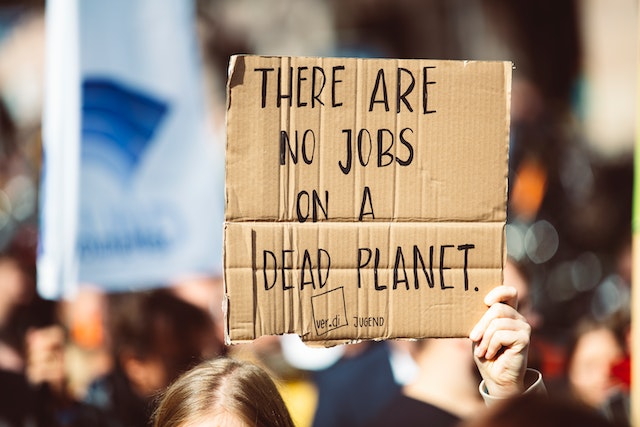In an effort to escape greenwashing claims or short term economic investments, many opt for climate inaction, oblivious of its real and dangerous consequences.
There is an economic cost that naturally comes with taking sustainable actions and initiatives, that being decarbonization or sustainability training for employees, the short term of becoming a sustainable organization can be more or less costly.
However, the long term will most definitely prove the cost-effectiveness of such sustainable investments.
Furthermore, neglecting or choosing to ignore climate action will inevitably result in dangerous and expensive obstacles that could threaten the very survival of the organization.

A holistic understanding of the cost of climate inaction
When confronted with the costs of taking climate action and implementing sustainable policies, companies can have a dangerous tendency of believing it to be too expensive to be worth the investment, or plainly unnecessary.
However, the cost of climate inaction is too high to even take the risk, because the cost is not solely an economic and measurable expense, but rather a social cost and reputational loss too difficult (and expensive) to amend.
In fact, when companies, regulators, and policy makers think and talk about the cost of decarbonization, for example, there is a tendency to reduce the latter in monetary terms, however, it rarely takes into account the negative effects uncontrolled carbon emissions have on society and the economy.
Engage employees in the sustainability strategy
Nonetheless, it is difficult to put a price on everything that will be affected by climate change. From biodiversity, to human lives, or cultural heritage, there is no price tag that can be assigned to such basic elements of our world.
One thing is clear, looking solely at the economic cost of climate change mitigation actions is a very poor way of understanding what sustianability is about.
This very limiting way of understanding climate action does not consider past successes and benefits of climate policies and mitigation actions. We can take the global movement for the protection of the ozone layer as a prime example of how insignificant economic costs are in comparison to our own survival as a species.

The bottomline is we cannot omit the economic costs of climate change, as we would be forgetting about the cost of climate inaction, same as we cannot forget about the benefits, economic and otherwise, of taking climate action on time.
Putting our minds, work and money to protect the planet has great benefits, including the improvement of people’s standards of living, reducing the scarcity of resources worldwide, and putting an end to unsafe living conditions and economic instability caused by adverse climate conditions or pollution, for example.
How can companies expand their influence to tackle climate change?
Taking climate action and understanding the consequences of not doing so is a democratic duty, this is, it encompasses all people, specially those with a bigger impact on the planet. But how can companies translate this duty beyond corporate boards and expand their influence to tackle climate change?
We believe that employees are far from being indifferent from participation in sustainable efforts, and actually look for the opportunity to be actively engaged and find purpose in having a positive impact through their jobs.
Climate change & climate action
In DoGood we believe that working collectively can help us find that which alone may seem unattainable or useless. That is why we think the workplace is the perfect environment to find that collective eagerness to make a difference, both for the sustainability and purpose of the company and a more sustainable way of being for all.
Through our technology we are able to activate and track employees’ impact, creating engagement that translates into improved ESG metrics, reputational value and an overall positive impact for the environment and society.







